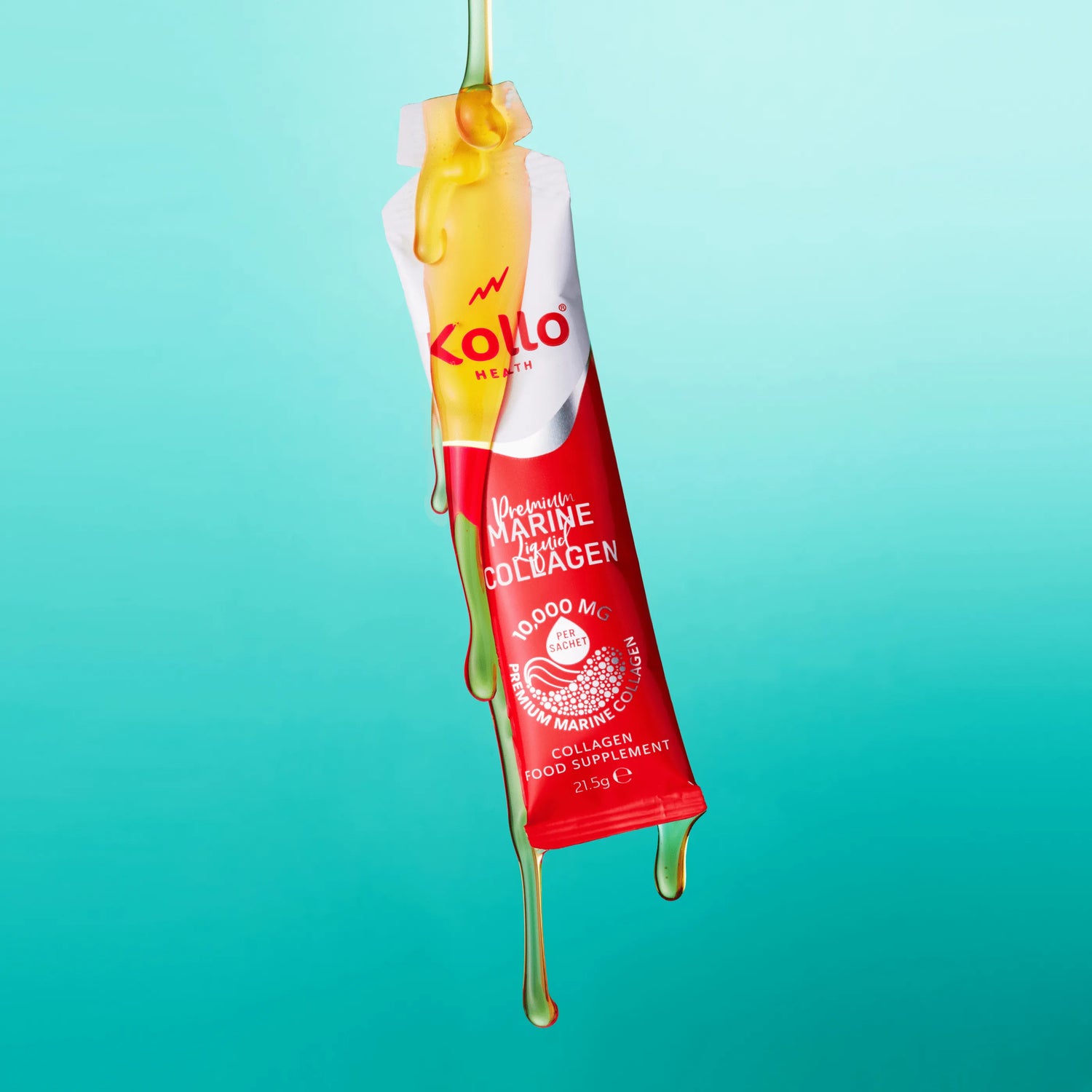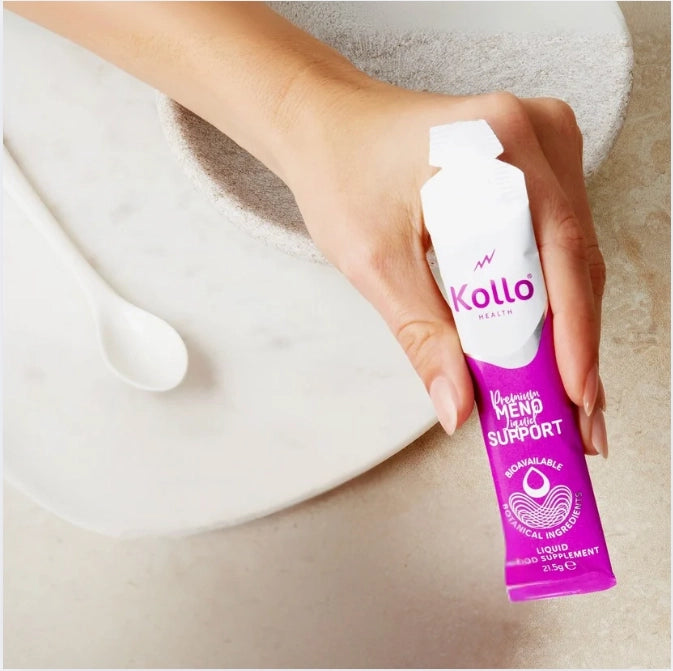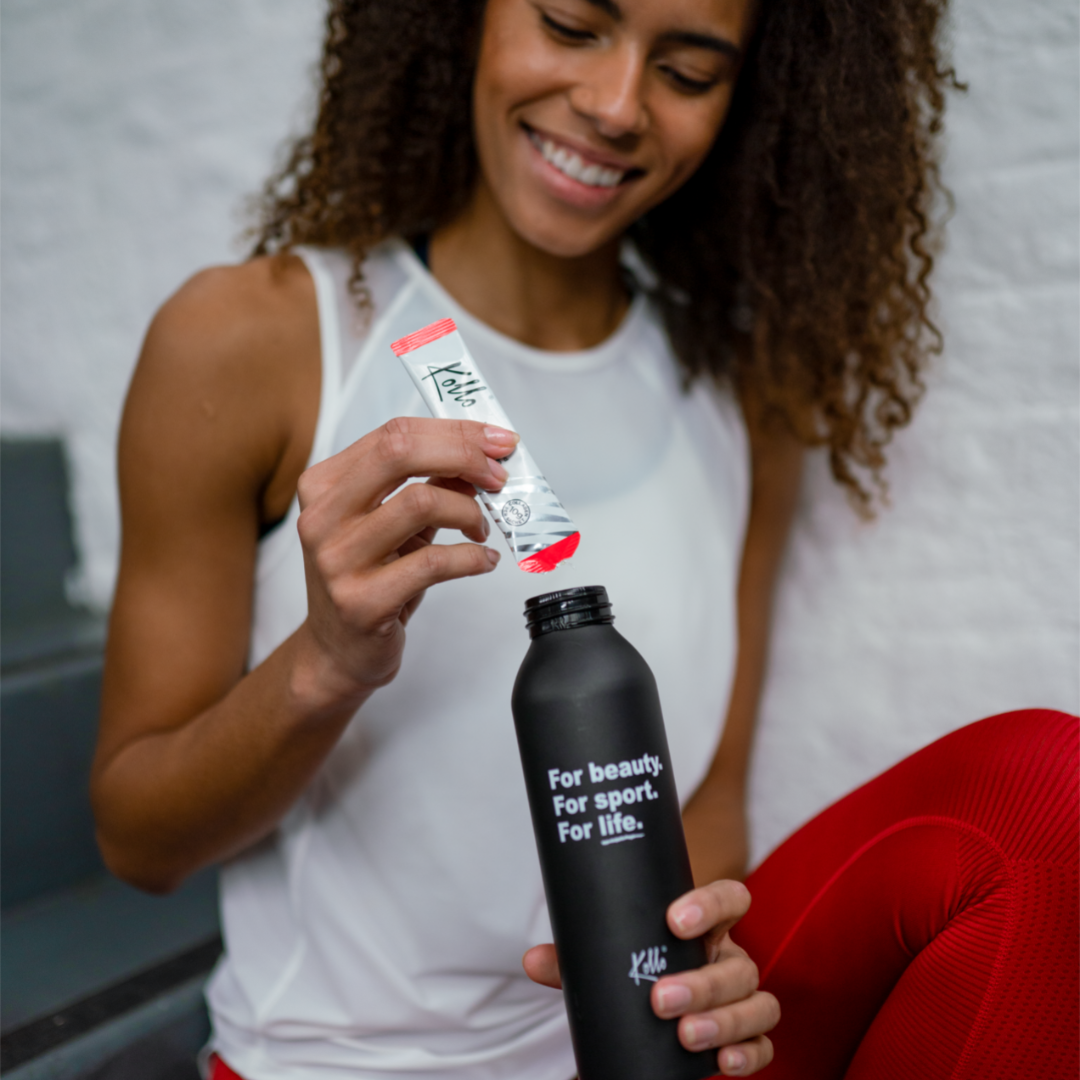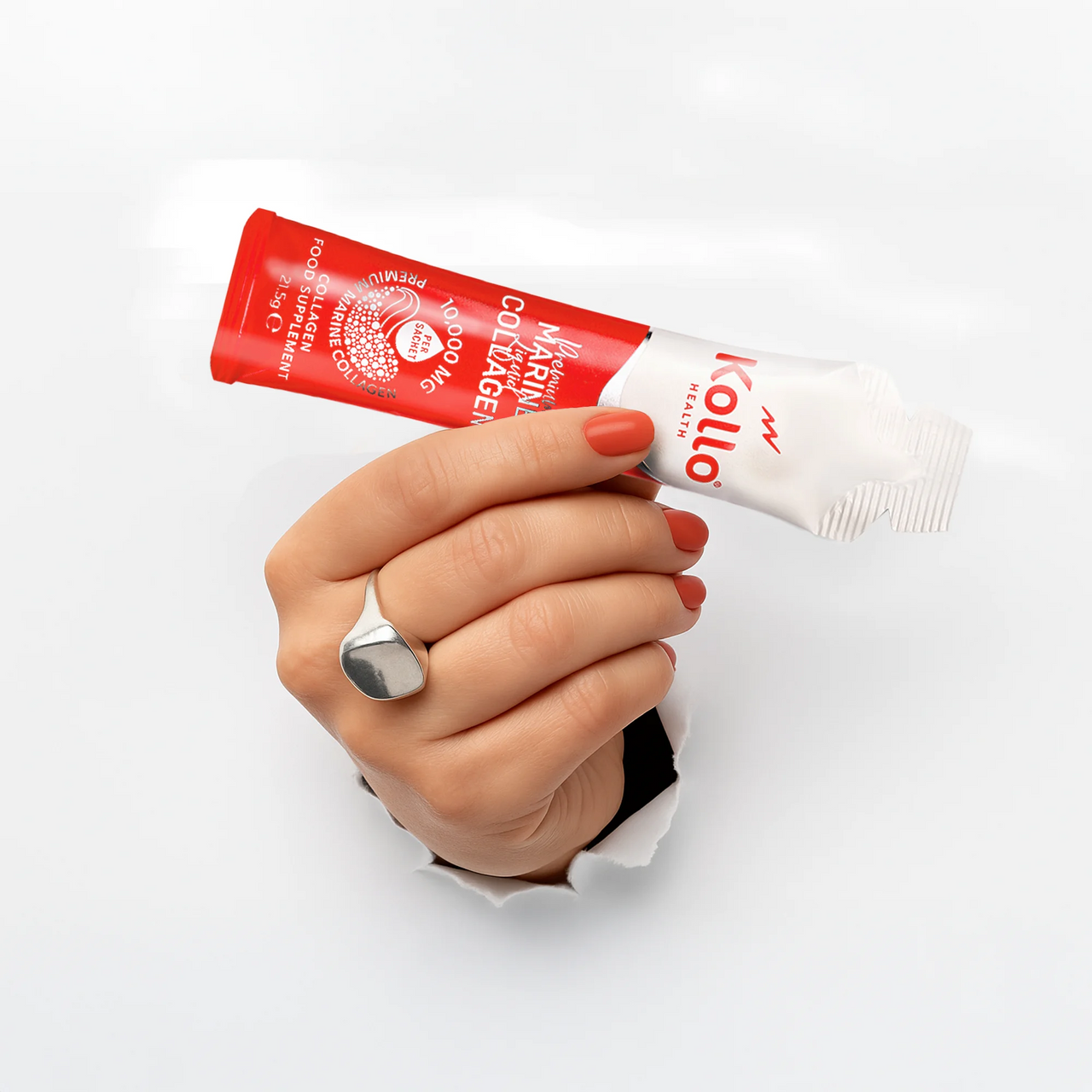Collagen powder vs liquid collagen
Experts have known the benefits of collagen from a beauty perspective for decades. When combined with a balanced diet, collagen can reduce the signs of ageing, relieve joint pain, and build muscle mass. So it's no wonder collagen supplements have proved to be so popular.
However, up until recently the only way to take collagen supplements was in powder or capsule form. This limited uptake somewhat due to the inconvenience of having to mix formulas. All that changed with the introduction of liquid collagen. These easy-to-consume products promise the same health benefits as powder collagen. But they remove all the hassle. Are considering adding collagen to your diet? Or are you currently taking powder collagen? The question is whether you should switch to liquid or stick with what you know.
In this article, we compare beauty collagen powder vs liquid collagen. You will see for yourself which one is best for you.
The benefits of beauty collagen and why do you need it?
Collagen is not some magic formula made by men in white coats in the lab. It’s a natural protein found in the cells of all mammals. Collagen is the most abundant protein in the human body.
The job of collagen is to bind the body's cells together. It provides the scaffolding, strength and structure for connective tissues. As a result, collagen has a strong presence in our skin, bones, hair, nails, ligaments and tendons.
Our bodies produce three main types of collagen:
-
Type I Collagen: This exists in all parts of the body except cartilage.
-
Collagen Type II: This is mostly concentrated in the bones, ligaments, tendons, skin and hair.
-
Type III Collagen: This is only found in cartilage.
The problem with collagen is that our bodies find it harder to produce as we age. Healthy people produce abundant amounts of collagen until they are around 25 years old. After that, collagen production tails off by around 2% per year.
The only way to combat this is to add collagen fuel to our bodies via food and/or supplements. Oral supplements are the most effective. This is because they allow the collagen nutrients to be easily absorbed by the body and distributed where your body needs them.
The science shows collagen supplements provide the following benefits:
-
Increased skin elasticity
-
Improved skin hydration
-
Enhanced muscle growth
-
Improved bone density
-
Reduced gut permeability
So if you are not using collagen supplements as part of a healthy and balanced diet, you should be. The question we are going to answer here is, which type of supplement is best: beauty collagen powder or liquid?
Beauty Collagen: Liquid vs. powder
Collagen supplements are available over the counter in various formats. These include powder, liquid, capsules, drinks, creams and gummies. This can make it difficult to know which one is the right choice for you to achieve your health goals.
Let's start by breaking beauty collagen supplements down into their basic formulas. There are two main types: powder and liquid. Collagen powder can be a standalone supplement or used in capsules. Meanwhile, liquid collagen goes into drinks, gummies and creams.
Now we know the two main types, we can look at the key differences between them. In the next section, we’ll look at how they compare. We will explore potency, portability, sustainability and more.
Beauty collagen powder
Collagen powder is the traditional way of taking collagen supplements. Typically, you combine this type of supplement with food. However, some prefer to dissolve it in a liquid such as smoothies or juice. Some brands have proved to be difficult to dissolve, so this is something to consider when making your decision.
Potency
Most nutritionists agree that we should be consuming between 10-20 grams of collagen per day. Dosage varies across brands but most collagen powders typically contain 15-20 grams.
This is nearly twice as much as a typical liquid dose of around 10 grams. So if you are hoping to increase your daily collagen intake to the maximum, powdered collagen supplements may work out more cost-effective.
Source of collagen
Collagen powder can contain both marine and bovine collagen. But most manufacturers use bovine collagen because it is cheaper to produce. Bovine collagen is rich in Type I and III collagen so it’s good for muscles, bone, ligaments and cartilage.
However, producing bovine collagen has a much larger environmental impact than marine collagen. This is because it comes from cattle. These animals release large amounts of methane, one of the most damaging greenhouse gases.
Portability
Powder collagen can come in a sachet or bulk powder tubs. The second option is the most popular because it is much more cost-effective than sachets. However, carrying around a large container is not practical for most people.
This limits the use of powder to meal times. This is when a scoop of powder can be easily added to meals during the cooking process. Consuming powder supplements at any other time is much less convenient.
Additional ingredients
Collagen supplements contain more than just collagen. So consumers need to be aware of what other ingredients each product contains. However, powder collagen contains fewer additional ingredients than liquid collagen.
This can be a good or bad thing. Some of these additional ingredients can add much-needed vitamins. While others are sweeteners that add flavour at the cost of calories. So always check the ingredients of your chosen supplement before making a decision.
Pros
-
Easy to combine with food
-
Available in bulk powers or sachets
-
Rich in Type I, II and III collagen
Cons
-
Less convenient
-
Requires blending with food or drink
-
Can be difficult to dissolve in some liquids
-
Made from bovine collagen which is less sustainable than marine collagen
Liquid collagen
Liquid collagen is the new kid on the block. Typically it’s supplied in small sachets that you can consume on the move. This ease of use is one of the biggest advantages of liquid collagen over powder collagen. But what other advantages does it have?
Potency
Liquid collagen contains fewer collagen peptides per serving than collagen powder. Check the manufacturer's label for details but most liquid collagens contain around 10 grams of collagen. However, the science tells us that this is enough to experience all the key benefits.
Source of collagen
Most liquid collagen supplements use marine collagen, which is rich in Type I and II collagen peptides. Type I collagen is good for strengthening bones, ligaments, tendons, skin and hair. While Type II collagen has a strong presence in cartilage.
Producing marine collagen also has less environmental impact than bovine collagen. And marine collagen is suitable for people that eat fish but not meat. So if you are a pescatarian that cares about the environment, marine collagen is the way to go.
Portability
Liquid collagen comes in small, ready-to-drink sachets. These make it easy to consume on the move. There is no large tub, mixing spoon or cup to carry around like with powder supplements. You can simply open the sachet and drink it on the spot.
While mixing powdered collagen only takes a few minutes to make, it’s still much less convenient than liquid collagen. Most people just keep a few sachets of liquid collagen with them all the time. This way, they can consume them when they feel like it.
Additional ingredients
Another advantage of liquid collagen is that it often contains more additives than just collagen peptides. Some of these additives are there to add flavour, but others include vital minerals.
The actual additives included can vary depending on the manufacturer so always check the ingredients. Kollo Premium Liquid Collagen includes vitamins B and C which help to maintain good health and wellbeing.
Pros
-
Quick and easy to use
-
You can drink it on the go
-
Mixes easily with food or drink if needed
-
Formulated with other vitamins to provide more health benefits
-
Made from marine collagen which is more sustainable than bovine collagen
Cons
-
More expensive than powders
-
Only contains Type I and II collagen
-
Can be difficult to measure intake
Why liquid is better for most people
As you can see, both powder and liquid collagen can deliver the dosage of collagen people need to lead a more healthy lifestyle. But they do it in a very different way. This makes choosing between them a challenge.
Both types have their pros and cons, but we find that most people prefer the convenience that comes with liquid collagen. It’s much easier to keep a few sachets on you and drink them when you need them, rather than mix up a powder drink.
Plus, there is no need to carry around a large tub of collagen or premix drinks in the morning before you set off for work. You can just grab a handful of sachets and go. This convenience far outweighs the increased cost of liquid collagen for most people.
Kollo is the #1 rated health collagen supplement
Kollo is the UK’s leading liquid collagen brand. Each sachet contains 10g of premium marine collagen combined with added vitamin B and C to help maintain healthy skin and bones.
Studies have shown that when taken for 12 weeks, Kollo’s unique formula helps to improve skin, hair and nails. It also supports stronger bone, joint and cartilage structure. Check out the our Kollo collagen sachets for men and women today.







